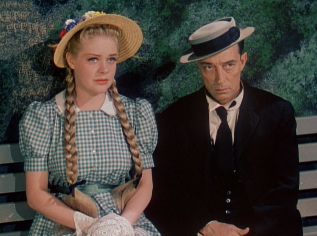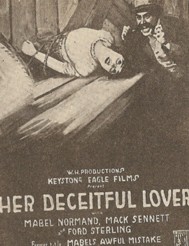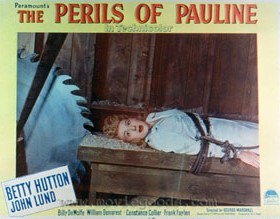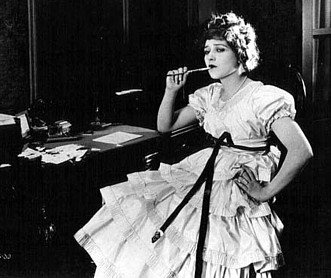 *---*
*---*
 *---*
*---*

Two films Mabel Normand and silent film comedy fans will not want to miss on DVD are "Hollywood Cavalcade" (1939) with Alice Faye (pictured above alongside Buster Keaton) and Don Ameche, and "The Perils of Pauline" (1947) with Betty Hutton and John Lund. Both are decidedly fictional yarns about early Hollywood; done, incidentally, in beautiful technicolor. Yet they contain more than a few overt, and sometimes direct, references in them to the actual Mabel Normand and Mack Sennett story -- with a bit of Sister Carrie thrown in for drama. The portraits rendered of the film industry in both movies is singulalry fascinating in what they say about the formation of Holllywood and about Hollywood at the time these films were made -- clearly very much had changed, and there is a fair amount of distortion and revisionist history by the latter as it attempts to re-live and recreate the former.
But there are, even so, some authentic reminders and touches of Keystone and the silent film era. In the case of "Cavalcade," Sennett himself both appears (including giving a short speech) and reportedly assisted in the film's production. And while Betty Hutton is presented in "Perils of Pauline" as playing serial queen Pearl White, her character far more resembles a Mabel Normand type. Indeed, Hutton had originally been slotted by Paramount to do a bio-pic of Sennett in which it was intended she would play Mabel, but wound up making "Pauline" instead. Between the two, "Pauline" is probably the more enjoyable film, but both have plenty in them that will be of interest to movie history buffs, including, in the case of "Cavalcade," supporting roles and cameos by Buster Keaton, Ford Sterling, Ben Turpin, Chester Conklin, Hank Mann, Snub Pollard, Al Jolson, and Rin Tin Tin Jr., as well as Sennett; while "Pauline" counts among its cast Chester Conklin, Hank Man, Snub Pollard, William Farnum, Paul Panzer, James Finlayson, and Creighton Hale.
Another not dissimilar tribute and treatment of early Hollywood, though in black and white, is the later "Abbott and Costello Meet the Keystone Kops" (1955). Here Sennett again shows up briefly as himself, speaking a few lines to Costello. While not the epic "Cavalcade" and "Pauline" in their way are, it's better than average Abbott and Costello fare, and holds its own as nostalgia and casual entertainment.
Later Note. Marilyn Slater, subsequent to my posting this, passed along these remarks, courtesy of both herslf and William M. Drew; with Mr. Drew having among his many scholarly distinctions (as some of you already know) a special expertise and interest in the subject of Pearl White:
"I was talking to William Drew about your opening page and he told me that the co-author (with P. J. Wolfson) of the script of Betty's 'Perils of Pauline' was none other than Frank Butler, who had written 'The Nickel Hopper' twenty years before!
"According to WMD [i.e. William M. Drew], Mabel's film was only the second film the former screen actor is credited with having written. So since Butler had actually known and worked with Mabel (she had, after all, played a major role in his career as the success of his film with her launched him as a screenwriter), it is not improbable that he drew on his memories of her in depicting the real-life Pearl White."
Post-PostScript. And at the very last, Marilyn also very kindly and graciously (as usual) furnishes us with this most apt and (for us) timely article on the Betty Hutton-Mabel Normand connection, and that coincidentally she's had on the back-burner for some time -- until now...
See http://looking-for-mabel.webs.com/bettyhutton.htm

"MARY PICKFORD: HER SECOND HUNDRED YEARS IN FILM
"Tuesdays at 2:30 pm
April 6, 13, 20, 27, 2010
Bruno Walter Auditorium
New York Public Library for the Performing Arts
Dorothy and Lewis B. Cullman Center
111 Amsterdam Avenue
between 64th and 65th streets
(212) 870-1700
http://www.nypl.org
ADMISSION FREE
"Mary Pickford the first international star of the cinema, made her film debut in 1909 at the Biograph Studio on 14th Street. The public adored the girl with the golden curls and everyday her popularity grew. For there was honesty to her performances that she understood, which compared to the stage, cinema required her acting to be much smaller for the camera, with subtle reactions and gestures. Rarely playing upper-class women, she soon specialized in depicting children on screen, and she was upfront in meeting everything that that life threw at her. Now as then people are glad to know this spunky creature that never seems to grow older."
Back in 2008, the drama department of Kentridge High School (located in Kent, Washington; just and not very far south of Seattle where I live) put on a production of Jerry Herman's "Mack and Mabel." Had I known at the time it was being performed at Kentridge, I would probably have gone to go see it myself (and certainly now in retrospect, knowing what I do now, I would most definitely have.) Unfortunately, I only learned of it recently by way of a not very well filmed video on YouTube and which has the cast and Elizabeth Hake, who plays Mabel, singing "Look What Happened to Mabel." Well, to get straight to my point, it was and is the very BEST rendition of that song I ever heard done, even including Bernadette Peters and company on the original Broadway soundtrack (which, by the bye, is available at amazon.com); not to mention having also listened to some half a dozen versions of the same by other artists.
Now this is not to say there aren't some problems. From the beginning the delicatessen motif Herman uses in that song never made much sense, biographically or lyrically, to begin with. The Kentridge people did a nice job in helping to get around this by having some others of the cast, rather than just Mabel, sing some of those lines; thus making the song more realistically plausible as well as palatable to those of us who know better. Ms. Hake's voice has a marvelous range, and she brings a texture and dimension to the vocals that raise the song high up from what anyone else (I know of) has previously done with it; and smartly avoids sounding too much like Betty Boop (as others, regrettably, sometimes sing it as.) On the downside, near the end of the song is a pepsquad, halftime roll-over which the number could easily have done without. Otherwise and allowing for pardonable production constraints of a high school drama department, it's exceedingly well done.
As mentioned, the video posted at YouTube is poorly filmed. However, I am making inquiries to see if something better isn't available, and reportedly (as of my asking) there is, in fact, a more proper DVD of the show to be had. When and if I find out more, I will let you know. Meanwhile, here is "What Happened to Mabel" by Kentridge, at least good for listening to if leaving much to be desired as far as watching goes. To compensate for the latter, Howard Keel singing "I Won't Send Roses" is included (Danny Lindgren, incidentally, played Sennett in the Kentridge show.)
["Mack & Mable - Kentridge H.S. 5th Ave Awards Show"]
["Howard Keel sings I Won't Send Roses"]
"Raggedy Rose" (1926) will be screened at the upcoming Niles Essanay Silent Film Museum Mid-Winter Comedy Festival, Feb. 12-14, in Fremont, California.
RE: Sunday Afternoon, February 14, 2010 1 P.M.
Phil Carli at the piano
For more info, see: http://www.nilesfilmmuseum.org/mid-winter_10_sked.htm
For those who might not yet have had the opportunity to hear what Del Henderson -- who was one of Mabel Normand's main Biograph co-stars, circa 1911-1912 -- sounded like, here's a clip from the W.C. Fields' film "You're Telling Me" (1934) in which he plays the Mayor (the complete film you can catch on YouTube here.) Henderson, of course and as many of you are already aware, also appeared in several other talkies, including sound shorts with Laurel and Hardy, the Little Rascals, and the Three Stooges; as well a number of other of Fields' feature films such as "The Old Fashioned Way" (1934) and "It's a Gift" (1934).
Previous Announcements continued
Return to Mabel Normand Home Page